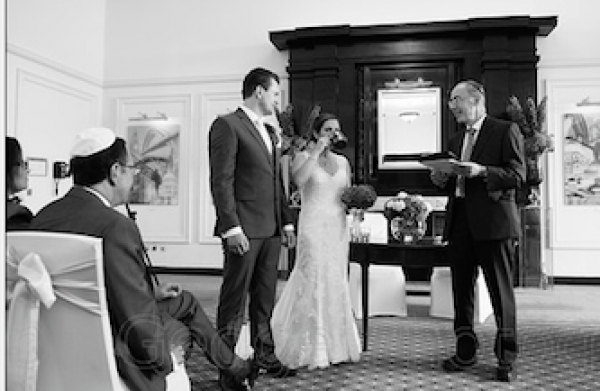
by Michael | May 22, 2018 | Blog
Is there much interest in mixed-faith ceremonies? Surely they make up only a minute proportion of marriages?
Much of my work as a civil celebrant involves mixed-faith ceremonies. And I notice that such ceremonies are now becoming mainstream.
Not long ago I read that 45% of Americans are intermarried. That includes 46% of mainline Protestants, 32% of Evangelical Protestants, 22% of Catholics and 44% of Jews. I don’t have the UK statistics, but it wouldn’t surprise me if the trend were not similar.
In any case, that means a lot of people are intermarrying.
So what do you have to think about if you are planning a mixed-faith wedding?
Disadvantages
One obvious problem can be the family (indeed, in my experience, this area can sometimes be very fraught!) .
Whether or not the family is bankrolling the wedding, and therefore ‘pulling the strings’, religion is a potential minefield. Even though the parents may not actually be all that committed service-attenders, they often have an absolute expectation of a traditional ceremony. So there’s immediate conflict and pressure on the couple.
In such cases, the couple need to acknowledge and understand the disappointment that intermarriage might cause. But compromise is possible. An example might be that the father can still walk the bride down the ‘aisle’, (even if the aisle isn’t actually in a religious building).
However, the couple must not be bullied into doing what they do not want or believe.
Another thing the pair need to consider is eventual children, and the question of how (religiously) to bring them up. I don’t think there is any categorical guidance one can really give – it’s a decision for the couple alone, but they do have to be prepared to confront it.
Advantages
Being ‘put on the spot’ by marrying means that both partners will need to sort out their religious stance. They can learn about their partner’s customs, and this will help them create a meaningful wedding ceremony – and guide them in their future spiritual life together.
They will be able to work with their celebrant to agree on a service that is in accordance with their beliefs and desires. They can then include customs and traditional rituals from either religion as they choose – a kind of “edited highlights”, perhaps?
I am currently booked to perform a Jewish wedding (under the marriage canopy) for a Jewess and Christian. We’re having a New Testament reading and a hymn, but most of the rest will be traditional Jewish (with a couple of ‘extras’ thrown in).
The couple are also selecting readings relevant to them and which underline their mutual love and willingness to make a commitment to each other. These personalised readings can lift the occasion far above the mundane.
Compromise
Parents can be reassured that any grandchildren will be taught about their religious background (even if they may not actively practise it), that they will visit for certain religious holidays, and that parents will be able – and welcome – to play a part in their grandchildren’s lives.
It may take time, but a beautiful interfaith wedding may actually bring the families together and pave the way to harmony.
Featured image: courtesy of Philippa Gedge
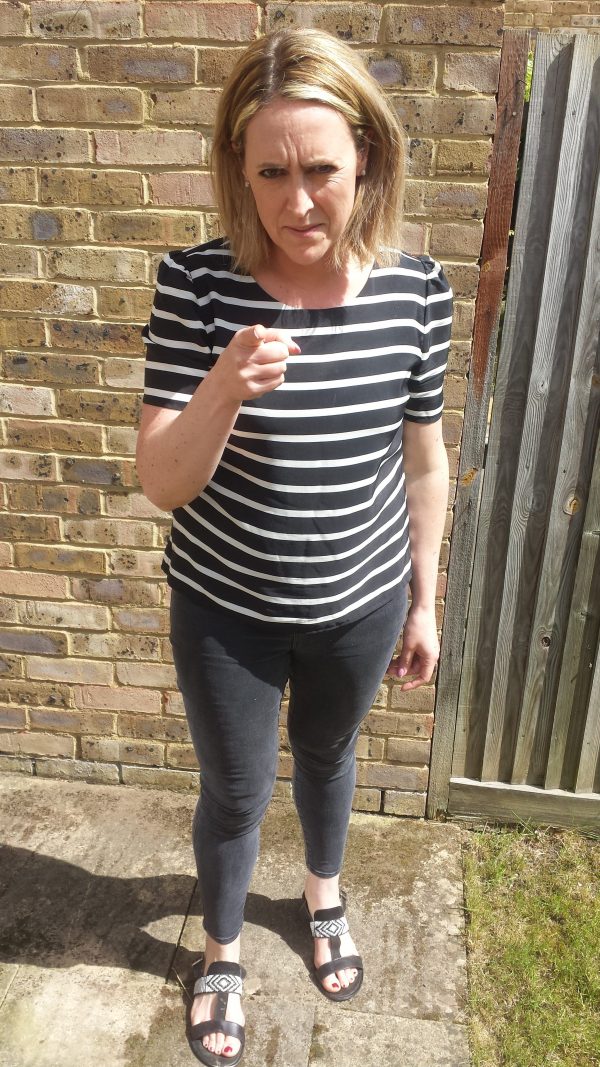
by Michael | May 11, 2018 | Blog
Sadly, couples are not always free to marry as they please. Very often they encounter opposition from their family. I know one mother who threatened to boycott the wedding (taking her whole family with her) because the couple had not opted for her chosen celebrant! It makes one wonder whose wedding it actually is.
The most common reason for opposing the wedding is disapproval of the new spouse. Perhaps he/she is not of the “correct” social class or colour. Maybe it’s a question of his/her sexuality. The truth may well be disguised, with a pretext such as “he/she isn’t worthy of you” or “they won’t be able to support you.”
The guest list
All weddings face the inevitable question: whom do you invite? It’s a tough one to answer at the best of times. You will probably start with close family and friends, but what if your closest relatives oppose your union?
Do you still include them?
Rejecting the rejectors
Do you decide to leave them out and just opt for your friends and (supportive) relations? After all, do you want negative people at your big day? They might bring the mood down – and, at worst, cause trouble.
Certainly, you’ll think twice before inviting people openly hostile to your union. On the bright side, they might decline and at least you’ll have gained kudos by having extended the olive branch!
Another olive branch
Another benefit that could accrue from inviting disapproving relatives is that they might, despite their own prejudices, attend and actually enjoy your tasteful and personalised ceremony. Wouldn’t that be something if you were able to ‘convert’ them and retain – even develop – a relationship with them?!
For many of us, there is the bond of love that unites us with our families. We may not always like our relations, but to upset and potentially do without them for the rest of our lives is not always desirable. Giving them a chance to stay connected with you (even loosely) is worth the effort.
If the worst comes to the worst, at least you’ll know you tried. And if it brings you together, couldn’t that be precious?
Come what may, your wedding will be a commemoration of love, with promises for the future. It’s not the day to heal rifts, but it may be the pathway to do so, and that is something which should be embraced.
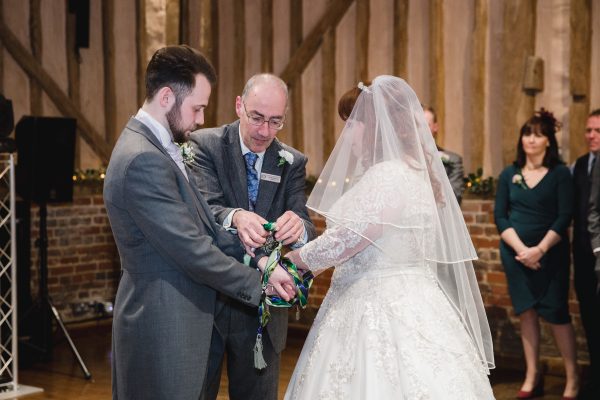
by Michael | Sep 19, 2017 | Blog
Wedding shackles? Sounds a bit melodramatic!
Let’s have a look.
It’s over forty years since people were given free choice as to the type of wedding ceremony they could have. That happened in Australia. It took much longer to get established over here, but England too now gives you the opportunity to have the ceremony that you actually want.
However, judging by my experience at wedding fairs, the majority of people think that the only choices are a full religious service (from a prayer book) or a (secular) register office ceremony. They seem quite surprised when I tell them that the service can be personalised and as religious (or not) as they want.

Putting ON the shackles!!
Source: louiedonovanphotography.co.uk
So, in case you’re a bit confused too, here are some guidelines.
What you MUST do
The bottom line is that, in order to marry legally in England, the marriage has to be registered with the registrars and certain words pronounced aloud. You can only do this at the Register Office, or at a licensed venue (if the registrars can come out there), or in a C. of E. Church.
What you CAN do
You may be thinking about a personalised service. So this won’t be one that, as you move down the ‘conveyor belt’, is the same for you as it is for the next person, and the one after that.
The way you can achieve a unique ceremony is to use a civil celebrant (like myself!). Ensure the mandatory stuff is complete like this:
- Hold your ceremony in a venue licensed for weddings, such as certain hotels. The registrars normally come out (at a price) and will conduct their standard service. As soon as they have done so, your civil celebrant can stand up and start leading the ceremony of your dreams.
- Go along with two witnesses (in your jeans, if you wish!) to the local Register Office. (Book up first!) Once you are legally married, you can proceed (either immediately or even in a day or two) to the venue of your choice where your Civil Celebrant can conduct your special ceremony.
One advantage of number two is that you can go (almost literally) anywhere to hold yourceremony. That might mean an island, a mountain top, a monument, beside the water – you are only limited by your imagination, practicality and permission!
Types of Ceremony
The beauty of a civil celebrant is that you are not obliged to hold a fully non-religious ceremony. Nor is the opposite the case. You may want a compromise. Perhaps you are a mixed-faith couple, unable to marry in your own religious buildings, but who still want a religious service. The civil celebrant can write such a ceremony. Perhaps your parents want religious elements, but you do not. Again, the civil celebrant can help.
However, you want your ceremony, your civil celebrant can advise and guide you.
That way you have abundant choice, and your ceremony will be everything that you want it to be.
And why shouldn’t it be?!
Featured image source: thegroomsays. blogspot.com
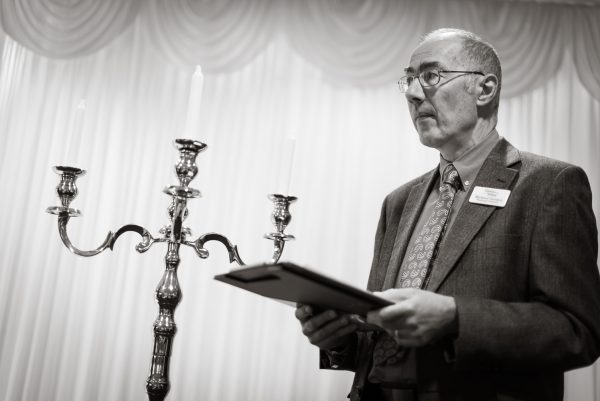
by Michael | Jun 13, 2017 | Blog
“I don’t mean to be rude, but do we actually need civil ceremonies?” The question emerged over networking when a lady I had just met found out what I did for a job.
No offence was intended, or taken. And, to some extent, she had a point.
A religious society
After all, over 50% of the UK population consider themselves Christian (according to recent research). So why would they need civil ceremonies at all? A little over 25% professed no religion. So they’ve got the option of a secular ceremony at the register office. OK, that leaves some people out, but it does cover most people.
But hold on a moment!
Religious objections
Not everyone who claims to be “religious” wants a full, standard religious ceremony, do they?
And what do you do, if you do want a religious ceremony, but are marrying someone of a different faith? Church isn’t an option, if you are Catholic and divorced. What if your church won’t accept you because you’re gay? And what if a religious service doesn’t really rock your boat, but do want a blessing or a prayer (mainly to keep parents happy, say)?
The secular option
In all those cases, when the Church won’t provide what you want, you have to turn to the Register Office. There they will read out the standard, necessary words to make your marriage legal. But, unfortunately, the ceremony must be totally secular (and impersonal). It can be a bit of a conveyor-belt operation.
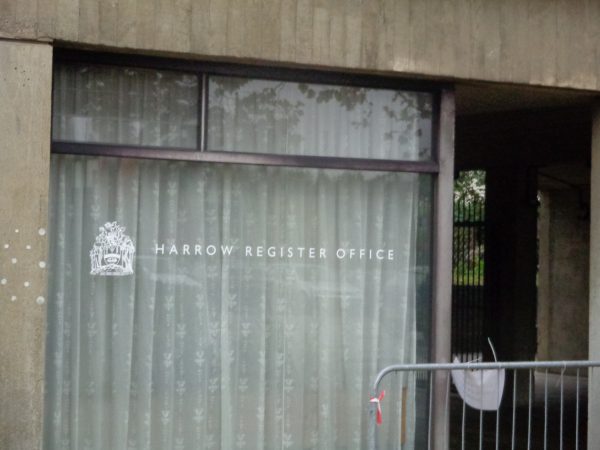
In surroundings that may not be much to write home about!
So, I hear you ask, is there another option?
A real choice
Indeed. As I explained to the lady, that is where a civil celebrant comes into his or her own.
The assets of a civil celebrant are that they build a ceremony from scratch. A good celebrant takes the time to work with the clients to offer ideas and also guidance about what is possible and might work. He will ask questions (and supply answers too), so that he can build up a full picture of what the couple wants. He will then write or compile a ceremony that reflects their personalities and beliefs, and is everything they want it to be.

Photo courtesy of Philippa Gedge
Not only will the ceremony be personalised and unique but it will tick the other box: it can be as religious as the couple want it to be.
It should be pointed out that civil celebrants are not (yet) licensed to conduct legal marriages, so the registrar ceremony is still compulsory. However, once the legal formalities are over, you can enjoy a fabulous meaningful ceremony that will be memorable for all the right reasons!
I believe, after our conversation, that that lady understood my role a bit better – and didn’t regret her question too much!
Of course, if any reader wants to follow up with me, I’d be delighted to explain more. Please feel free!
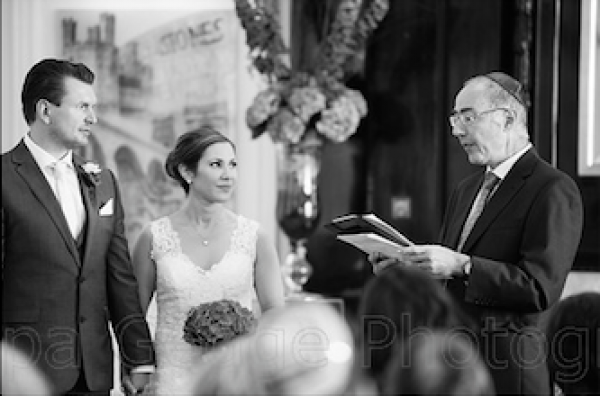
by Michael | Jan 16, 2017 | Blog
Wedding bells are ringing. Or are they?!
A Muslim and Jewess want to marry. A Christian and a Jew are very much in love. A Pagan and Russian Orthodox want to tie the knot.
A mixed-faith marriage is a bit special, is it not?
Having conducted a number of fabulous mixed-faith marriages in the last years. I’d answer with a resounding“yes”.

Photos courtesy of Philippa Gedge Photography
Not so simple!
Well, not everyone might be as enthusiastic as me!
What if the couple want a religious (or even, part-religious) wedding? How will they manage, if their church/synagogue/mosque/temple/you name it refuses to recognise their union?
The obvious answer is a civil ceremony. There are two kinds, so you have a choice.
Register Office Service
The register office service contains the necessary wording to make the marriage legal, so it is indispensable. Unfortunately, the ceremony itself is (reasonably enough) standard and somewhat impersonal. More to the point, it has to be totally secular. There may be no reference whatsoever to religion or even use of religious vocabulary.
So this solution, though worthy in its way, may not meet the needs of most mixed-faith couples.
Civil Ceremony
Another choice is to use a civil celebrant. As a celebrant-led ceremony does not encompass the legalities, it would have to be in addition to the registrars’ service.
As for venue, you would have two options. If your venue is licensed for marriages, the registrars will come there, perform their service and leave. At which point the civil celebrant can begin your personalised ceremony.
Alternatively, you can marry at the register office (by appointment), with two witnesses, and proceed (that day or a following one that you select) to the venue of your choosing, be it indoors or outdoors. Then you can celebrate your bespoke service absolutely as you would wish.
Advantages
The beauty of a civil ceremony is that you can incorporate your ideas and desires into the ceremony. It’s your big day, after all. So why shouldn’t you have full input? And if you are short of ideas, let your celebrant offer suggestions.
Your celebrant may well not be ordained, but he/she will still be able to include religious elements. These might be readings, music or ceremonial items. The most beautiful thing is that both partners’ religions can be honoured in this way.
Perhaps you know a mixed-faith couple who are planning their wedding, but are not happy about the options open to them. If so, please send them my way, and I’ll be delighted to have a non-obligation chat with them. That way, they may still end up with the ceremony of their dreams!
How cool would that be?!






